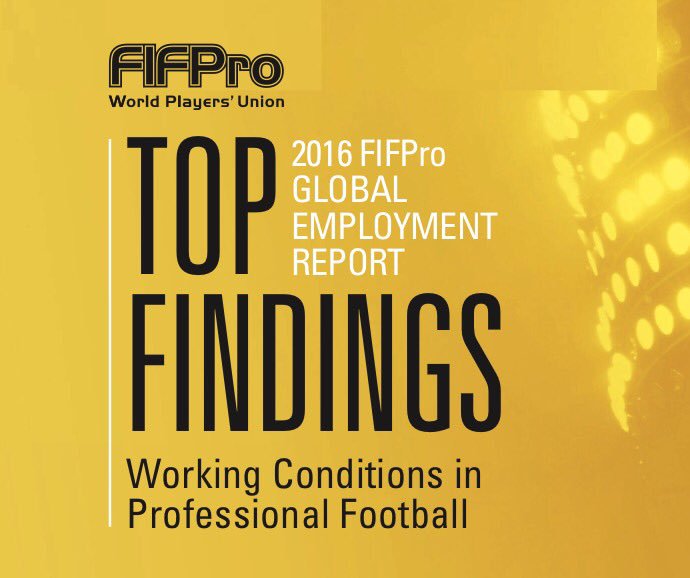FIFPro today has released the findings of its first worldwide survey of working conditions in men’s professional football. 2016-fifpro-global-employment-report looks at the life of players in a way that has never been done before.
The aim of the survey is to raise awareness of the realities faced by footballers – especially those who are not among the elite at the top of the sport – with a view to better understanding and improving conditions in the industry.
Independently assessed by the University of Manchester in Britain, the survey is based on feedback from nearly 14,000 current players in 54 countries and 87 leagues in Europe, the Americas and Africa. It is believed to be the world’s largest survey of professional athletes in any sport using direct participant data.
Click here to download: the 2016 Global Employment Report. the Top Findings of the 2016 Global Employment Report
Most players have short and fragile careers, the survey shows. They experience irregular pay, have uncertain futures and are often not prepared for life after football. With an average contract length of just under two years, footballers work in a highly competitive and fragmented market.
The survey debunks the myth that players enjoy a highly privileged lifestyle.
More than 45% surveyed earn less than $1000 (USD) a month. The median net monthly salary worldwide ranges between $1000 and $2000 (USD).
It is only at the very top of the game that players are rewarded handsomely: just 2% of players received $720,000 (USD) or more per annum in take-home pay.
Among the key findings, 41% of players globally reported that they did not receive their salary on time on at least one occasion in the past two seasons, with the most common delays ranging from one to three months. It is a fundamental right of any employee to be paid in full and on time; that this most basic of rights is not respected in world football is unacceptable, according to FIFPro.
The survey also found that more than 700 players (6% of those surveyed) have come under pressure to either rescind or renew their contract by being separated from their teammates and ordered to train alone. While FIFPro has been aware of this pressure tactic for years, it is the first time it has been able to quantify the scale of the problem.
In another example of unjustified treatment, 29 percent of players who moved for a transfer fee said they were either put under pressure to join another club or did not go to the team they wanted to.
Almost 7% of players reported they had personally experienced direct approaches to fix matches over the course of their career, with that figure rising to 11% for players in their thirties. Players in lower wage brackets, and those paid late, were more likely to be offered bribes to fix matches.
“This report for the first time provides a detailed and accurate picture of what the average professional player experiences,” FIFPro General-Secretary Theo Van Seggelen said.
“We now have an evidence base for the reforms that are needed in the football industry. Overdue payables, forced transfers and training alone – all this must be a thing of the past.”
“We need to build a package of measures with all stakeholders. Clubs, leagues, confederations and FIFA must accept those failures of our industry. We need to guarantee minimum employment standards for all players and clubs in all countries, reform the international regulations and think about the economic future of football. The new FIFA president announced that he wanted to work with the professional game to bring about much needed reform. This report must be the starting point.”
A separate report covering Asia/Oceania, involving over a thousand players from eight countries, was conducted for FIFPro by the University of Malaysia in 2015.
The FIFPro Global Employment Report invited players to respond to 23 questions, covering topics such as salaries, contracts, transfers, training, match-fixing, violence, job security, health, well-being and education.

